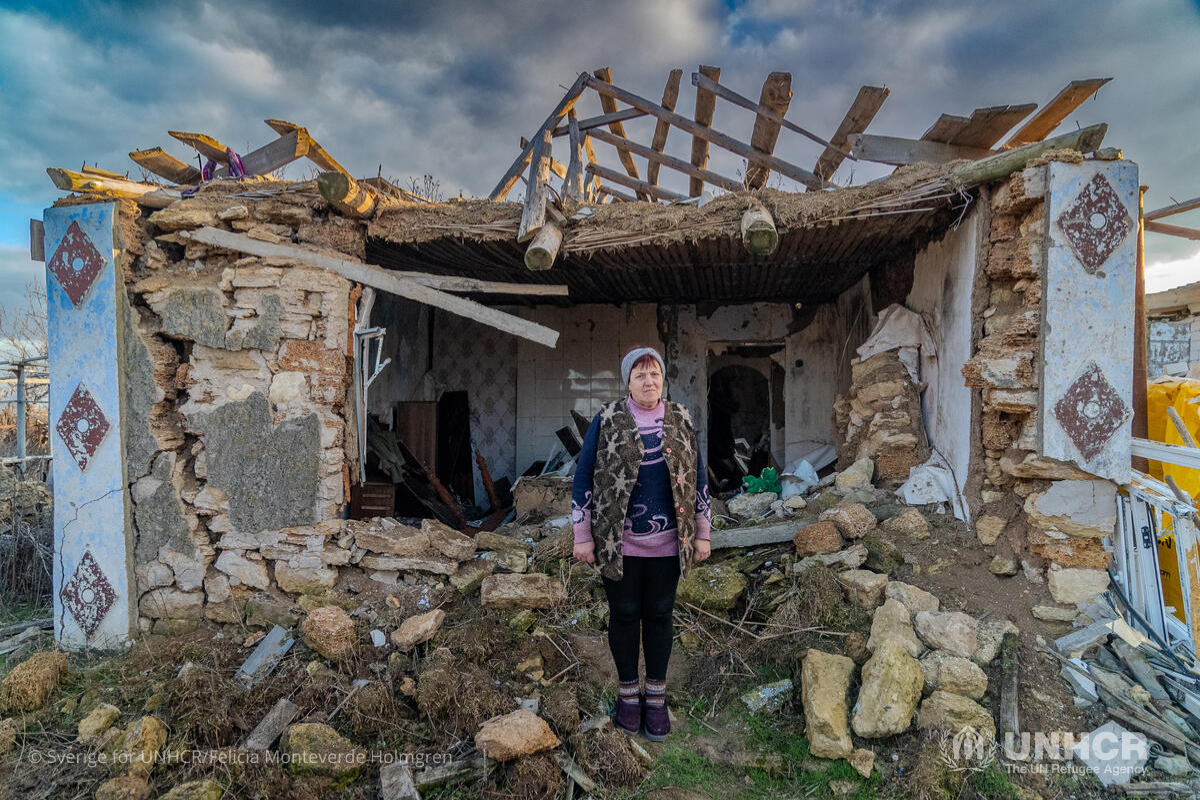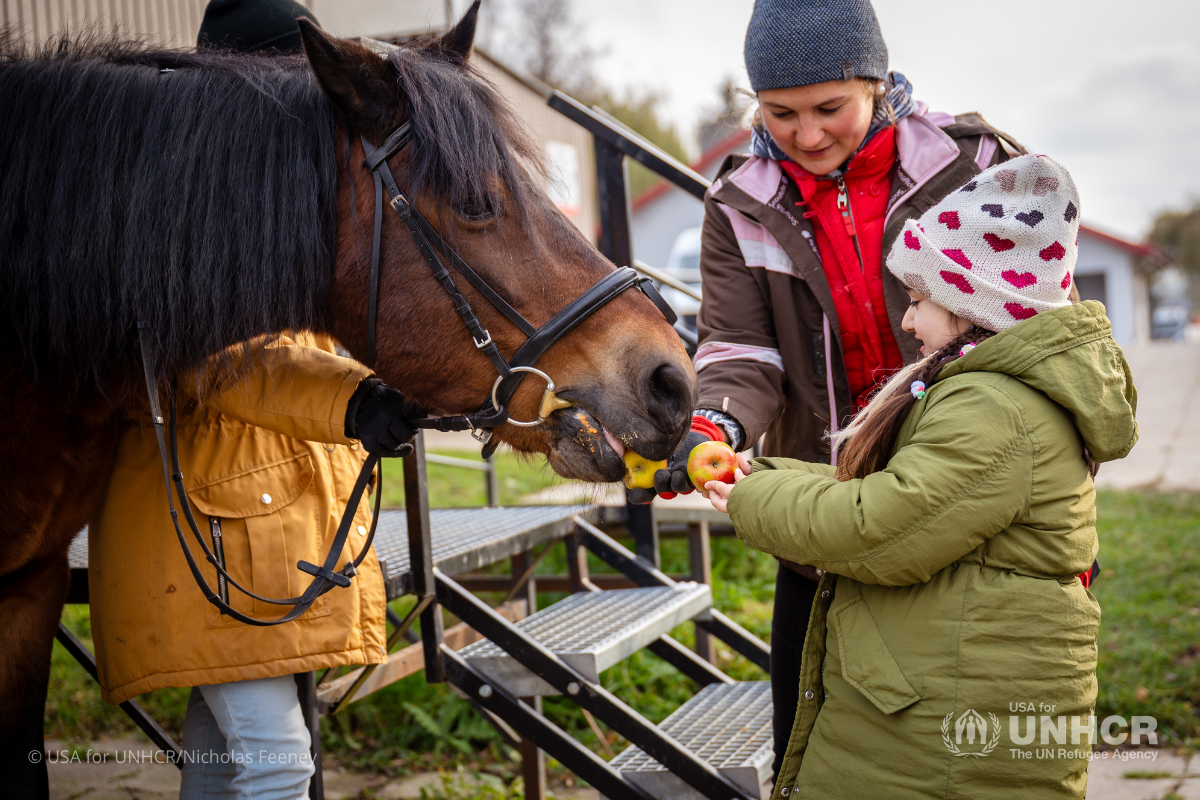How Syrian Refugees Celebrate Ramadan
Ramadan, the ninth month of the Islamic calendar and the holiest month of the year for all practicing Muslims, is an annual event marked by spiritual reflection, increased generosity and spending time with loved ones. During this special time, families and friends around the world come together to celebrate and eat food with each other after fasting from sunrise to sunset.
But for many Muslim families forced to flee conflict and persecution, Ramadan now marks a difficult time of the year when there may be less to eat and fewer people to celebrate with. Millions of refugees who escaped conflict in Syria to neighboring countries are struggling this year to put food on the table and are depending on cash assistance from UNHCR to celebrate Ramadan.
Here are four Syrian refugee families celebrating Ramadan during these difficult times:
Mounia, Lebanon

Mounia, a mother of two who fled Syria with her husband to Lebanon, still dreams of celebrating Ramadan like they used to. Ramadan in Syria was an exciting event that families eagerly awaited each year. Markets would be busy with a flurry of activity in the days leading up to the start of Ramadan as people shopped for ingredients to prepare special dishes and beverages for iftar. Families, neighbors and friends gathered together after a long day of fasting to celebrate breaking their fast with a delicious meal.
But this year, many refugees like Mounia and her family are struggling just to support their families. Mounia can’t think about the joys of Ramadan when she’s busy making tough decisions for her family, “What should I prioritize buying? Diapers, milk or food for the children?”
During these difficult times, Mounia is always reminded of happier memories of Syria, “Ramadan in Syria was so beautiful, it was really beautiful… Since we left Syria, nothing really matters like before. We used to diversify food, now we barely cook one meal.”
Shatha, Azraq Camp in Jordan

Shatha is only 14-years-old but has already spent half her life in a refugee camp. After her father passed away in 2016, her family, including her mother and siblings, fled from their home in Homs, Syria to Jordan. They now live in the Azraq refugee camp—one of the two main refugee camps in Jordan for Syrian refugees.
Despite her circumstances, Shatha has big aspirations for the future and hopes to be a detective one day. When she’s not at school, she’s at home taking care of her two younger brothers and helping them study.
This Ramadan is the family’s seventh in Jordan and it is at this time of year that Um Hadi, Shatha’s mother, misses her family back in Syria the most, “I call my mom every day to check on her.” Although Ramadan in Azraq is different than it was in Syria, the family continues to spend time praying and reading the Qur’an with each other.
“This month of Ramadan we should treat each other in a nice way and be kind too since it’s a month of forgiveness and compassion.”
Om Ghazi, Lebanon

Ramadan is an important time of the year for Muslims to practice spiritual reflection but also spend time with loved ones. Unfortunately, for millions of Syrian refugees who have been displaced from their country or lost loved ones due to conflict, Ramadan can bring back painful memories of the past.
Om Ghazi, a widowed elderly Syrian refugee living in a refugee settlement in Bekaa Valley, Lebanon is struggling to celebrate Ramadan this year without her family. She lost five young men in her family due to the conflict in Syria and spends Ramadan alone.
When she recalls what celebrating Ramadan was like in Syria, she feels the loss more deeply. “Ramadan was like heaven back in Syria, for its nights and its gatherings,” she recalls. “While Ramadan here, there’s no one from my family, my siblings, my loved ones… No one.”
Um and Abu Safwan, Jordan

This Ramadan, Um and Abu Safwan are spending it with fewer family members and less food on the table. Although they are surrounded by family, at this time of year Um Safwan can’t help but remember her four sons who she lost due to the conflict, “Sometimes I just wish we could go back in time, back to Syria and the whole family around us.”
Um and Abu Safwan are now the guardians for three of their orphaned grandchildren, Majid, Ammar and Mahmoud, whose parents passed away during the conflict in Syria. For Ammar, his grandparents are all he’s ever known, “I consider them my mother and father. They did everything for me. They hosted me and took care of me. Now I try to help them.”
When Abu Safwan reflects on how Ramadan was back in Syria, the memory he fondly remembers is of eating together with his family, “Safwan, Firas, Nashwan, Ahmed, Mohammad, Omar, my four daughters. All of them used to come to the family house. They spent the night and we would cook Mahashi or Magloubeh, or they would each bring a dish with them. Firas used to go in the morning to collect chickpeas and tahina, so that we could prepare a big breakfast together.”
Now, Um and Abu Safwan barely have enough left over to put a proper meal on the table and only eat meat once a week.
How to help…
This Ramadan, Muslims around the world are fasting from sunup to sundown and preparing for their daily iftars meals with friends and family. While Ramadan is a joyous occasion for most, Syrian refugees are struggling to celebrate, having lost loved ones or are unable to put food on the table for their families. By donating your Zakat this year, you are supporting these families in their greatest time of need.


